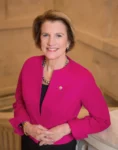As Congress moves closer to a budget deal, Senator Shelley Moore Capito has acknowledged the possibility of significant effects on Medicaid.
Medicaid is a joint federal and state program for health insurance and medical services, traditionally for low-income people but more recently also for the working class.
As of last month, 503,637 West Virginians were supported by the program, according to a state budget overview for the West Virginia Department of Human Services. That’s just under a third of all West Virginia residents.
Medicaid spending in West Virginia changes year to year, depending on factors like the eligible population. But generally Medicaid spending in West Virginia has been more than $5 billion — with about 80 percent of that coming from federal dollars.

“We’d like to move more of that to the states,” Capito, R-W.Va., said during a briefing with West Virginia reporters last week.
Vote-a-rama and Medicaid amendments
The Republican majority in the Senate, where Capito is in a top leadership position, went way into the night on Saturday to adopt a budget framework that now must fulfill the complicated trick of also gaining majority approval in the House of Representatives.
A major aspect of the framework is identify big budget savings to to fully extend President Donald Trump’s 2017 tax cuts.
A Senate amendment leaves in place an instruction for the House Energy and Commerce Committee to cut a minimum of $880 billion in spending. One of the biggest programs under the committee’s authority is Medicaid.
Capito, responding to a question last week from Tom Susman of WMOV Radio, cited the nation’s enormous national debt as a reason for looking at Medicaid during the ongoing reconciliation process.
“You can’t deal with Social Security through reconciliation at all. That’s against the law. So that leaves Medicare and Medicaid. We have $36 trillion worth of debt here that we have got to start turning turning the page on and moving it down,” Capito said.
“I mean that there’s no question that we’re at a tipping point here. And so the big drivers of our costs are, one of them is Medicare, and one of them is Medicaid.”
Medicare is the federal health insurance program for people age 65 or older and some younger people with disabilities or specific conditions.
In early March, the White House released a statement saying that the Trump Administration will not cut Social Security, Medicare or Medicaid benefits. However, the statement said cuts could be made under the rationale of fighting waste, fraud and abuse.
“The president has said he’s willing to look at waste, fraud and abuse, particularly in the Medicaid arena,” Capito said.
“We could also be looking at things such as duplicative billing through each one of the states. I read an article where there’s billions of dollars there. There’s got to be fraud and waste there.”
Some of Capito’s counterparts, like Senator Josh Hawley of Missouri, have described major concerns about touching Medicaid.
Hawley, a Republican, co-sponsored an amendment to strike a section of the budget framework directing the House committee “to cut $880,000,000,000 from Medicaid.” In other words, had the amendment passed, the committee would no longer have been directed to identify that cut.
Hawley’s amendment failed 49-50. Capito and Senator Jim Justice, R-W.Va., voted no.
Senators agreed to a different amendment by Republican Dan Sullivan of Alaska that would “establish a deficit-neutral reserve fund relating to protecting Medicare and Medicaid” — in particular, Sullivan posted, “for the most vulnerable, and strengthening Medicare so that it’s available for future generations.”
That one was adopted 51-48 with Capito and Justice voting in favor.

When the night was over, both Justice and Capito voted in favor of the overall budget framework.
“Staying up all night in order to pass a budget resolution that makes life better for West Virginians and enables President Trump to follow through on his agenda is what I was sent to Washington to do,” Justice said in a statement distributed by his office.
Capito stated, “The passage of the Senate’s budget resolution marks a critical step forward in delivering on the promises we’ve made to the American people.”
She added, “I was also proud to vote against uniformed and unserious messaging amendments by Democrats, which continued to show they care more about political points than what is important to Americans.”
An eye on Medicaid expansion changes
As the back and forth over the federal budget continues, Medicaid will be a recurring area of concern.
Capito, in the briefing with West Virginia reporters, described the possibility of instituting work requirements or changing the federal share for the Medicaid expansion population.
“I think everything’s going to be looked at,” she said.
The 2010 Affordable Care Act encouraged states to expand Medicaid to cover more low-income Americans lacking employer-provided insurance. Forty states participated, insuring about 21 million people since 2014 and reducing the national uninsured rate.
The federal government covers 90% of the expansion cost, significantly more than the average reimbursement rate for other Medicaid beneficiaries.
Capito alluded to the possibility of changing that 90-10 federal and state cost split.
“We did expand in West Virginia, and we’ve been expanded for a long time,” Capito said in the briefing.
“You’re reimbursed at a higher rate for the expansion population than you are for the general Medicaid population, which Medicaid was created for to begin with — disabled children, folks that can’t work, people with disabilities or low, low, low low incomes and are unable to get health care any other way. And so we don’t want to jeopardize what the core mission of Medicaid is and should be.”
West Virginia ‘trigger’ bill set aside
West Virginia legislators, considering the possibility of that change coming down, briefly considered a “trigger” bill that could have helped state government avoid a cost shift of an estimated $160 million.
Under the bill, if federal officials were to cut the amount West Virginia is reimbursed for the healthcare expenses of its Medicaid expansion population, delegates are preparing a refusal to fill the gap.
Last week, legislative leaders moved the bill to an inactive calendar with the conclusion of the regular legislative session rapidly approaching.
The deputy speaker of the House of Delegates, Matthew Rohrbach, told reporters that occurred because he’d received strong assurances “from someone dealing with the negotiations in Washington: they’ve heard us loud and clear. These changes to Medicaid don’t appear as though now they are going to occur.”

House Finance Chairman Vernon Criss, just after delegates passed a general revenue budget of more than $5 billion last week, said state lawmakers have been trying to figure out ways to be in position if the federal government makes changes to a big program like Medicaid.
“It seems that we’ve been reassured that they have decided to do something other than that,” Criss said. “We’re still not sure, but it was enough comfort to the leadership to be able to pull that off the calendar — and if we need to do it at a later time, we’ll do it at a later time.”
‘Swiftly oppose cuts’

Kelly Allen, executive director of the West Virginia Center on Budget & Policy think tank, said cuts to Medicaid would touch off a firestorm of response.
“As we saw this week in Charleston, Medicaid has a large, broad constituency that will swiftly oppose cuts that shift costs to the state, where legislative leaders have already made clear they will not be able to pick up additional costs,” Allen said.
“Without additional state dollars, each of the changes under consideration will inevitably result in cuts in enrollment, cuts to benefits, reductions in provider reimbursements, or some combination of all three.”
She said the current federal budget path would add to the nation’s debt, not reduce it. That’s a view shared by the fiscally-conservative Cato Institute.
“If our Congressional delegation is truly concerned about the debt,” Allen said, “they should abandon this reconciliation process altogether, which would add more to the deficit than the American Rescue Plan Act, CARES Act, and Bipartisan Infrastructure Laws combined.”
